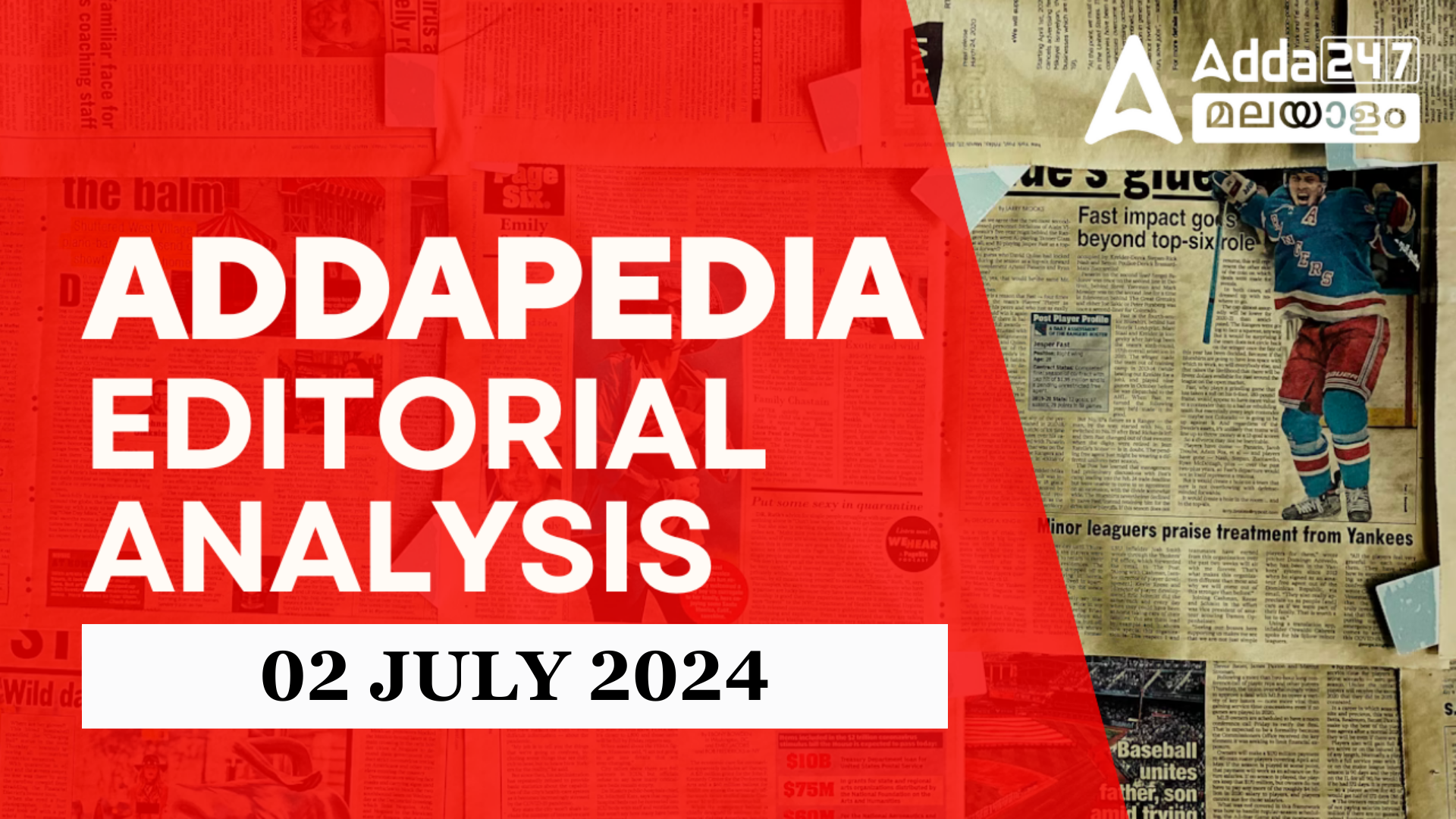Table of Contents
Addapedia Editorial Analysis: Daily News Editorial Analysis 02 July 2024
Addapedia Editorial Daily News , 02 July 2024: In this Addapedia Editorial Analysis, We cover Important News Editorials from Newspapers and provide you with detailed analysis. This ADDAPEDIA Editorial Analysis will help you in understanding the National and International events Current affairs and the background of a particular topic. This comprehensive News analysis will help you in Clearing CA and Interview for many exams.
Editorials usually cover a particular topic that might be National, State or any International event which is most important to acquire brief knowledge about the event. Editorials are written by Famous news analysts, Politicians, Business analysts, Civil Servants or a person who has immense knowledge in that particular field. Knowing Editorials will not only understand the geo-political relations but also how to write and describe any particular issue which helps especially in PSC, SSC and Banks Exams.
Whistleblowing in India
Julian Assange had leaked over 7,00,000 classified documents and videos linked to alleged US war crimes. For his whistleblowing and alleged role in breaching US security, Assange faced 18 charges and a maximum of 175 years in prison.
In June 2024, he reached a plea deal with the US Justice Department. This deal brought an end to his long legal battle and allowed him to be freed from prison.
What is Whistleblowing?
- Whistleblowing refers to the act of exposing information about illegal, unethical, or inappropriate activities within an organization, typically by an insider or employee.
- This information is often confidential and may reveal significant risks to public health and safety, financial impropriety, or violations of laws and regulations.
What is the legal regime in India with regard to Whistleblowing?
- The Whistleblowers Protection Bill was proposed in 2011 which become a law as Whistleblowers Protection Act in 2014.
- According to Whistle Blower Protection Act 2014, a whistleblower is referred to as a “complainant” and it is defined as any person who makes a complaint relating to:
- The committing of or an attempt to commit an offence by a public servant under the Prevention of Corruption Act 1988
- Wilful misuse of power by which demonstrable loss is caused to the government or demonstrable wrongful gain accrues to the public servant or any third party or
- The committing of or an attempt to commit a criminal offence by a public servan
- The Companies Act does not define
- Some of the famous whistleblowing cases were
- Shanmugam Manjunath case: An Indian Oil Corporation Officer who was murdered after he exposed adulterated fuel
- Lalit Mehta case: An activist who exposed corruption in the National Rural Employment Guarantee Act (NREGA) scheme.
- IPS Narendra Kumar Singh case- An Indian Police Service Officer who was killed after he exposed illegal mining in Madhya Pradesh.
What are some of the Concerns with India’s Whistleblowers Protection Act?
- Limited scope:
- Excludes private sector whistleblowers
- Does not cover armed forces and intelligence agencies Example: Corporate frauds may go unreported due to lack of protection
- Inefficiencies with WPA, 2014
- It fails to protect whistleblowers’ identities and establishes a flawed reporting and investigative framework.
- Complainants providing false identities or anonymous complaints are not recognised.
- Lack of time-bound investigation:
- No specific timeframe for completing investigations
- May lead to prolonged uncertainty for whistleblowers Example: Delayed justice in cases of exposed corruption
- Inadequate protection measures:
- Absence of specific provisions for physical protection of whistleblowers
- No witness protection program Example: Whistleblowers facing threats to life, as seen in some high-profile cases
- Absence of rewards/incentives:
- No provision for rewarding whistleblowers
- Might discourage potential whistleblowers from coming forward Example: Contrast with US False Claims Act which provides financial incentives
- Attacking whistleblowers
- Environmental activists have been called “urban Naxals,” a name which suggests they are anti-national and are detrimental to India’s economic growth.
Urban Body Finances
The 16th Finance Commission (FC) has begun its work, established under Article 280 of the Indian Constitution, primarily focusing on the devolution of the consolidated fund.
What are the challenges with Urban Body finances in India?
- Limited Tax Base: ULBs have a narrow range of taxes they can levy, primarily property tax, which is often under-assessed and poorly collected.
- Low User Charges: User charges for services like water, sanitation, and waste disposal are often kept low due to political considerations, resulting in insufficient revenue.
- Weak Financial Autonomy: ULBs rely heavily on grants from state and central governments, leading to a lack of control over their own finances
- High Expenditure Demands: The growing urban population puts immense pressure on ULBs to provide basic services and infrastructure like roads, water, sanitation, and waste management.
- Weak Accounting and Auditing: Many ULBs lack proper accounting systems and auditing practices, leading to financial irregularities and mismanagement of funds.
- Lack of Capacity: ULBs often lack qualified staff with financial expertise, hindering their ability to effectively manage their finances.
- Political Interference: Political interference in financial decision-making can lead to suboptimal resource allocation and prioritization of projects based on political rather than public interest considerations.
- Poor Creditworthiness: Many ULBs have weak credit ratings due to their financial instability, making it difficult for them to borrow from banks and financial institutions.
What about financial devolution to cities?
- Cities contribute around 66% of India’s GDP and about 90% of total government revenues. The World Bank estimates that $840 billion is needed for basic urban infrastructure in the next decade.
- Despite the efforts of five commissions since the 11th Finance Commission, financial devolution to cities remain inadequate.
- The fiscal health of municipalities is poor, affecting both city productivity and quality of life.
- Rapid urbanisation without appropriate fiscal action has adverse effects on development.
- Intergovernmental transfers (IGTs) to Urban Local Bodies (ULBs) in India are about 0.5% of GDP, much lower than the 2-5% typical of other developing nations.
- For instance, South Africa allocates 2.6%, Mexico 1.6%, the Philippines 2.5%, and Brazil 5.1% of their GDPs to their cities.
- Although IGTs make up about 40% of ULBs’ total revenue, issues persist regarding their predictability, earmarking for vulnerable groups, and horizontal equity.
- IGTs are crucial for ULBs, given their financial state and the need for stable support until their own revenues improve.
What about the taxation system?
- The introduction of the Goods and Service Tax (GST) has reduced ULBs’ tax revenue (excluding property tax) from about 23% in 2012-13 to around 9% in 2017-18.
- Intergovernmental transfers (IGTs) from States to ULBs are very low, with State Finance Commissions recommending only about 7% of States’ own revenue in 2018-19. Increasing the quantum of IGTs as a percentage of GDP is necessary.
- The 13th Finance Commission observed that “parallel agencies and bodies are emasculating local governments both financially and operationally.”
- Programs like the Member of Parliament Local Area Development Scheme and the Member of Legislative Assembly Local Area Development Scheme exacerbate this issue, distorting the federal structure.
What is the way ahead?
- In the absence of the 2021 Census, reliance on 2011 data is inadequate for evidence-based fiscal devolution.
- India has approximately 4,000 statutory towns and an equal number of Census towns, with an estimated 23,000 villages, all of which are effectively urban.
- If India continues investing in urban infrastructure at current rates, urban infrastructure will fall short, leading to water supply issues and untreated sewage
- These updated figures/data must be captured by the 16th FC, including the significant migration to Tier-2 and 3 cities.
- The 16th FC must consider India’s urbanisation dynamism and ensure IGTs to urban areas are at least doubled.
Can you answer the following question?
Despite constitutional provisions and various initiatives, Urban Local Bodies (ULBs) in India continue to struggle with financial sustainability. Discuss.
Addapedia Editorial Analysis 02 July 2024 PDF Download Link
കേരളത്തിലെ എല്ലാ മത്സര പരീക്ഷകൾക്കും ഓൺലൈൻ ക്ലാസുകൾ, വീഡിയോ കോഴ്സുകൾ, ടെസ്റ്റ് സീരീസ്, പുസ്തകങ്ങൾ, മറ്റ് പഠന സാമഗ്രികൾ എന്നിവ ചുവടെ നൽകിയിരിക്കുന്ന ലിങ്കിൽ ക്ലിക്കുചെയ്ത് കണ്ടെത്താനാകും.
***വരാനിരിക്കുന്ന പരീക്ഷകളിൽ വിജയിക്കാൻ ഞങ്ങളോടൊപ്പം ചേരുക***
*ലക്ഷ്യത്തിലേക്കുള്ള ആദ്യ ചുവടുവെപ്പ് | ADDA247 മലയാളത്തിൽ പരിശീലനം ആരംഭിക്കൂ*
Adda247 Malayalam Youtube Channel |
Telegram group:- KPSC Sure Shot Selection




